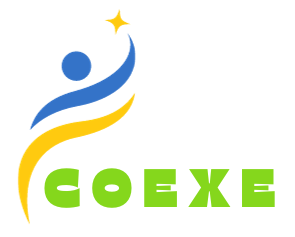Coordinator and Partner institutions
Coordinator: Ss. Cyril and Methodius University in Skopje (UKIM)
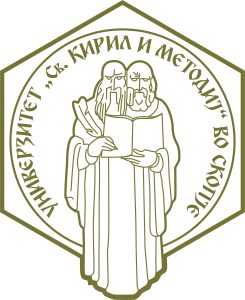
Ss. Cyril and Methodius University in Skopje (UKIM) is the first and oldest state university in the Republic of North Macedonia, established in 1949 with only three faculties conducting its primary activity of tertiary level education, organizing undergraduate, graduate, and doctoral studies. Today, it is a community of 23 faculties, five scientific institutes, four public scientific institutions – associate members, one associate member – another higher education institution, and seven associate members at the Ss. Cyril and Methodius University in Skopje has study programs in all scientific fields–mathematical, technical-technological, medical sciences and health, biotechnical, social sciences, humanities, and arts. The highest-ranked and most popular University in North Macedonia, in particular, can be represented by the following organization and structural figures: in the teaching educational process of all faculties are included more than 28,400 students in the first and 1100 students in the second cycle of studies. The thirdcycle – doctoral studies is realized within the School for doctoral studies at UKIM, with a total of 1071 students. In addition, over 3,100 teaching-scientific and associate and administrative staff participate in the realization of the teaching-educational and scientific process at the faculties and institutes. So far, Ss. Cyril and Methodius University in Skopje participated in more than 72 projects, including 16 as project coordinator, 52 as beneficiaries, and four as a third-party entities. Under the Erasmus+ program, UKIM participated in 12 projects. Under the other relevant programs, the following distribution is applied: – 27 projects under the FP7, – 24 projects under the H2020, – 6 under the COSME, and – 3 under the UCPM program. Currently, the organization participates in project activities under various programs such as Erasmus+, EU H2020, the NATO program, AUF, COST, IAEA, UCPM, IPA, and numerous bilateral projects. Ss. Cyril and Methodius University in Skopje (UKIM), as a member of the European Association of Universities (EUA), following the Institutional Evaluation Program of the European University Association (EUA). As part of the science and research activity of the University, under the entire community consisting of separate higher education and research units, 39 scientific journals are published. Each is adequately indexed in the prestigious electronic bases and platforms. Additionally, annual conferences are organized by the university units, each having both domestic and international backgrounds. Through its lifetime cooperation with various international organizations of the wider society, as a separate university unit, the Faculty of Economics – Skopje is an active member of several renowned international organizations, such as – ASECU (Association of South Eastern Economic Universities), – WCO (World Customs Оrganization), – CEESENet (Central and South-East European Ph.D. Network), – INCU (International Network of Customs Universities), and – EDUNIVERSAL. Additionally, our Faculty has concluded International Agreements for Bilateral Cooperation with many prominent universities and university centers worldwide, particularly 46. Our project involvement includes 14 project coordination and 14 involvements as partners under the Erasmus+ program through a carefully modeled approach. Notable mentions are past and currently active projects under the initiatives of EUROSTAT, Japan International Cooperation Agency – JICA, and the COST.eu programs. In the scope of activities, the Faculty of Economics – Skopje is home to numerous centers, notably: – Center for Economics Research (CER), – European Integration Training Center (EITR), – European Union Center for Data and Information (EUi), – Regional Training Center – World Customs Organisation (RTC-WTO), – Career Center, and – Junus Center for Social Businesses.
Partner: University of Split (UNIST)

University of Split, UNIST (established in 1974) is a comprehensive scientific and teaching institution, consisting of 11 Faculties, 1 Academy of Arts and 4 Departments. There are around 20,000 students enrolled in its undergraduate, graduate and post-graduate programmes. The focus of the research work carried out is on disciplines characterized by natural, cultural, historical, social, economic and other features of the region as a part of the Croatian Adriatic and the Mediterranean region as a whole. This involves research and protection of art and construction heritage, philology, field crops, oceanography and fishing, Adriatic botany and zoology, island and coastal economy, Adriatic tourism, maritime law, nautical science, naval architecture and a range of other specific disciplines such as chemical engineering, civil engineering, architecture, electrical and mechanical engineering, social sciences, kinesiology, humanities, health sciences, forensics. UNIST is a member of several International networks (EUA, Tethys, UNIADRION, EAIE) that promote internationalisation of HE and exchange of good practices in different disciplines. UNIST is a member of the European University of the Seas alliance, which is building a long-term, joint strategy for education and training with links to research and innovation, and to society, aimed at fostering an inclusive, sustainable and resilient future for people and planet, with the specific vocation of dealing with the sea. UNIST is also a cosignatory in over 550 Erasmus+ cooperation agreements and 80 bilateral agreements with universities worldwide. By participating in the Enterprise Europe Network, of which it has been an active member since 2008, UNIST has created a wide network of university-industry collaboration, serving as an opportunity to provide a variety of support services to SMEs and students to gain practical knowledge but also to have an active role in the society. UNIST is participating in European projects management and implementation since FP6 and is currently engaged in the European structural fund projects, Interreg and Horizon2020 projects, and the Erasmus+ programme. UNIST is currently engaged in 1 ERC, 4 H2020 research projects, 1 Interreg projects, 11 Erasmus + projects, 2 ESF projects, 1 EIT, 1 COSME and 3 ERDF projects with a total worth over 30 mil. EUR. The University’s efforts in establishing itself as an open science pioneer are proven in the U-multirank 2020 results, where it was ranked in the world’s top 25 performing universities in the field of Open Access Publications. As a part of the same ranking, in terms of overall performance, UNIST ranks as the best HEI nationwide which was also supported by the results of THE ranking. Implementation of the projects like Erasmus+ SEA-EU and H2020 ReSEArch-EU will strengthen the scientific and innovation capacities of the University through the development of a joint long-term research strategy that contributes to the sustainable development of the economy and society, strengthening the resilience and antifragility of the established alliance of the universities and the implementation of so-called co-design, co-create and co-delivering practices with local stakeholders.
Partner: The University of Niš (UNI)
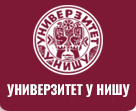
The University of Niš (UNI) was founded in 1965 as a state owned HE institution. It is a medium-sized, mature and welldeveloped academic community, comprising 14 faculties in all fields of science. Most of those faculties have composite structure, i.e. various departments, divisions or majors, offering wide and diversified study and research opportunities at both undergraduate and graduate levels, including opportunities to obtain a PhD degree. The University of Niš presently has 24,669 students at all levels of studies, 1,723 teaching staff and 686 administrative and support staff. UNI has significant experience in international programs such as Tempus, Erasmus, FP6 and FP7. Within the EM ECW program, the University of Niš entered the exchange of students and teaching staff in 2008 as a partner in the Project BASILEUS. In 2011, UNI became a consortium member of the Project EM2STEM. University of Niš also became partner of other Erasmus Mundus programmes, such as SIGMA, ERAWEB, EUROWEB, GREEN-TECH, ERASMUS+, CEEPUS, HORIZON 2020.
Partner: The University of Valencia
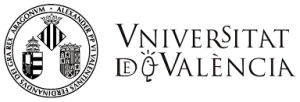
The University of Valencia participates in this project through LINEEX, the Laboratory for Research in Behavioural Experimental Economics of the ERI-CES, the Centre for Research in Social and Economic Behaviour created on the 28th September 2006 by the University of Valencia. The main objective of LINEEX is to analyse and study the social and economic behaviour from an interdisciplinary perspective based on a theoretical, quantitative, experimental and computational methodology. LINEEX is also focused on the transference of the results of this interdisciplinary research to support policy-making and regulation, as well as fact-driven decision-making in private companies. These objectives are specified in the following research areas:
• Microeconomics and game theory
• Experimental economics
• Behavioural economics
• Social networks
• Applied industrial organisation and quantitative methods
In the last years, LINEEX has been developing a research and transference of knowledge agenda to support policy-making in the EU and other regions. Specifically, LINEEX’s team has already carried out the following projects for the European Commission:
• IBSEN Bridging the gap: from Individual Behaviour to the Socio-tEchnical MaN 2020-FETOPEN-2014-2015-RIA
• Modelling risk in the IFM-CAP model (JRC/SVQ/2014/J.3/0036/NC)
• Behavioural insights in cybersecurity (JRC/SVQ/2014/J.3/0039/RC-AMI)
• Behavioural aspects of online digital product consumption (JRC/SVQ/2013/J.3/0012/NC).
LINEEX is located at the Building of Research Institutes at the Social Sciences Campus (Campus Tarongers) of the University of Valencia. Created in 1998 LINEEX is a venue to bring researchers, public and private entities together on the fields of Behavioural and Experimental Economics. LINEEX is one of the largest laboratories in the world with a main room equipped with an 8×8 matrix of workstations, a mobile laboratory of 66 tablets and five servers serving different computing purposes. Furthermore, LINEEX has the technology to develop large-scale online experiments. In particular, LINEEX’s IT infrastructures and experimental experience have provided with the resources to develop economic experiments, carry out large computing processes and analyse data to more than 150 research teams from more than 20 countries. LINEEX experience may be checked at https://lineex.es/en/projects/
LINEEX develops and runs experimental software with z-Tree and oTree, the most well-known platforms for experimental economics research, but can also use different programming web languages depending on the project requirement such as Web based (HTML, CSS, Javascript, HTML, Ajax, PHP using Yii), and Android. The hardware and software are installed, maintained and supported by the LINEEX IT team. Since developing experiments for third parties is the main activity of the laboratory, every research team willing to run experiments has the freedom to decide the optimal way of designing the experimental research. The LINEEX management team takes the responsibility of recruiting subjects, conducting experimental sessions and managing payments for experimental subjects. The team makes sure that experimental data is delivered with the highest quality standards by thoroughly following the Experimental Economics execution protocol.
STRENGTHS OF LINEEX (UNIVERSITY OF VALENCIA)
• Proven experience in programming online behavioural experiments
• Proven experience in programming laboratory behavioural experiments
• Proven experience in designing behavioural experiments
• Proven experience in designing protocols for online experiment execution
• Own IT infrastructures and software technologies for the development of behavioural experiments
• Proven team experience in consulting projects for the JRC
• Proven experience in building customised samples and recruiting experimental subjects in EU countries
• Proven experience in quantitative analysis to support JRC policy-making
Project team (UKIM)
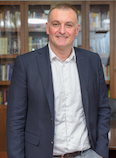
Predrag Trpeski, Ph.D., is a Full Professor at the Department of Economics and a Dean of the
Faculty of Economics – Skopje. Previously held positions by Prof. Trpeski include Deputy Minister of Finance in the Government of the Republic of Macedonia, a member of the Council of the City of Skopje, and a Vice-Dean for Academic Affairs. His vast research activity also includes papers such as “Labour market outcomes in selected South-Eastern European Countries in the process of accession to the European Union” and “Business cycle synchronization of a small open EU-candidate country’s economy with the EU economy.” By providing sustainable management, coordination, and expertise, prof. Trpeski is one of the vital members of our team.

Mijalche Santa, Ph.D., is a Full Professor at the Department of E-Business and a Vice-Dean for Science and International Cooperation. His main research areas are enterprise modeling, system analysis and design of information systems, knowledge, learning, and innovation. He also actively participates in the work of postgraduate studies. His involvement in numerous projects, such as COST Action TD1405 – European Network for the Joint Evaluation of Connected Health Technologies (ENJECT), gives us the necessary foundation and experience to successfully implement the project. Additionally, his continuous communication and contact with international partners grant him the position of the main contact person, project coordinator, etc.

Prof. Daniela Bojadzieva, Ph.D., is a Full professor at the Faculty of Economics with domestic and foreign education. Her scientific and research interests are focused on the following areas: microeconomics, macroeconomics, antitrust policy, regulation of monopoly activities, pricing policy and pricing strategies, industrial policy, and organization. Prof. Bojadzieva has published more than 30 papers and has participated in more than 20 conferences, symposia, workshops, and scientific forums. Furthermore, her participation in the realization of several domestic and international projects, such as COST-CA 16228 – European Network for Game Theory (2017 2021), greatly contributes to our team. In addition, Prof. Bojadzieva, in the period 2015-2019, is the Head of the EU Data and Information Center (EUi).

Gunter Merdzan, Ph.D., is a Teaching and research assistant at the Chair of Economics at the Faculty of Economics in Skopje at Ss. Cyril and Methodius University in Skopje (UKIM).

Kristijan Kozheski, Ph.D., is a Teaching and research assistant at the Chair of Economics at the Faculty of Economics in Skopje at Ss. Cyril and Methodius University in Skopje (UKIM).

Marijana Cvetanoska, Ph.D., is an Assistant professor at the Chair of Economics at the Faculty of Economics in Skopje at Ss. Cyril and Methodius University in Skopje (UKIM).

Irena Bogoevska-Gavrilova, Ph.D., is a Teaching and research assistant at the Chair of Marketing at the Faculty of Economics in Skopje at Ss. Cyril and Methodius University in Skopje (UKIM).
